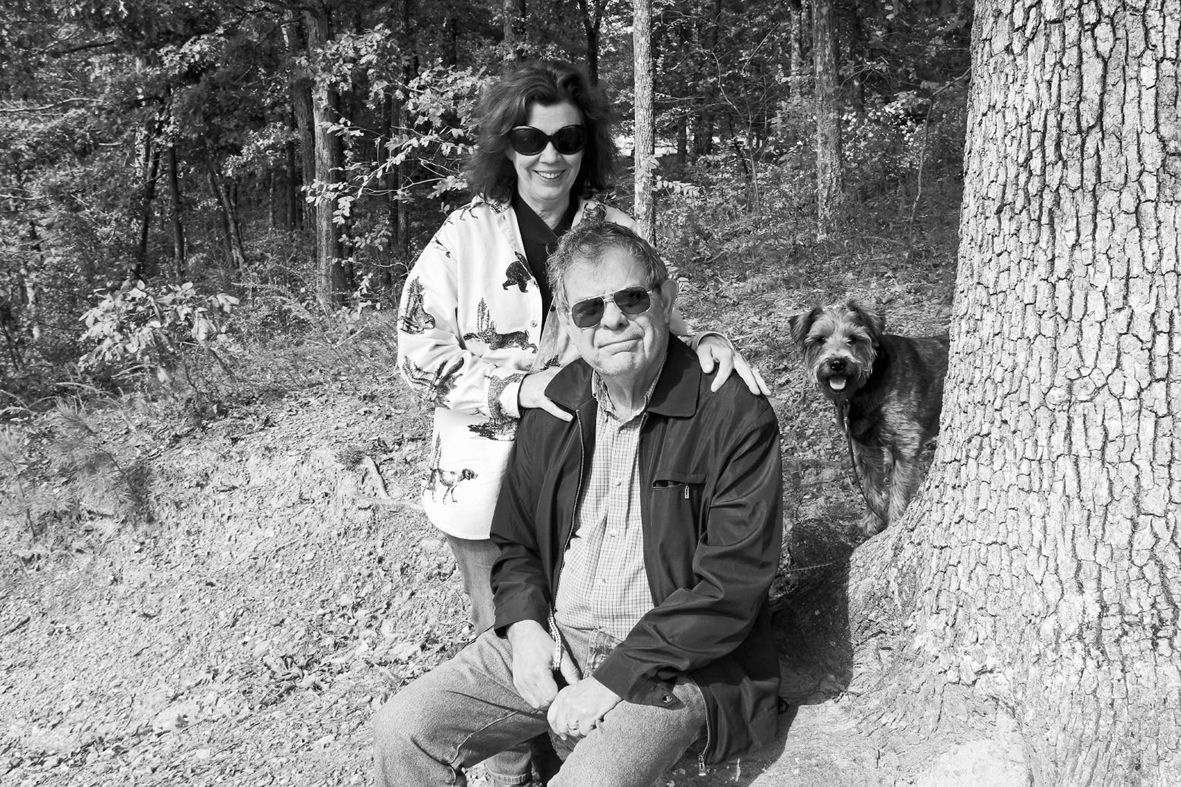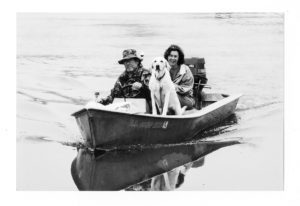
True Grits: Rheta Grimsley Johnson talks pets, politics and more
Syndicated columnist Rheta Grimsley Johnson, a native of Colquitt, Georgia, grew up in Montgomery and studied journalism at Auburn University. Her career included several years as a general reporter for various newspapers and United Press International. In 1983, the Scripps-Howard News Service began distributing her columns nationwide. She has won numerous awards for her writing, and in 1991 she was one of three finalists for the Pulitzer Prize for commentary. Today Johnson’s column is syndicated by King Features of New York and appears locally in The Advocate.
Johnson has authored several books, the latest of which is the memoir The Dogs Buried Over The Bridge (see our review here). Last month I renewed my interviewing relationship with her for this article.

Taris: Writing a memoir can, at best, be difficult, but to have the ability to write the calendar of your life through the years of your pets’ lives is quite unique. How did you process the original thought to reach the end result?
Rheta: It wasn’t a reach at all to write about my life using my best dogs as markers, demarcations. I hope it’s not a contrived approach, and it did not feel that way to me. The dogs I chose—or who chose me—seemed to suit my needs at any given time. There were a couple of notable exceptions I had no business adopting because I had not the space or time to make their lives enjoyable. As I like to say, career newspaper people are like dogs in that you can multiply our age by seven, and it seems to fit. That would make me 441 years old, which is about how I feel after my current book tour.
Taris: Is it more difficult in today’s digital world to promote a book, and do you enjoy the self-promotion aspect or is it difficult for you?
Rheta: I find it hard to sell my own book. I’ve written columns about books written by others that helped sell them, I’m told. But I’m not good at self-promotion or at social media. The rules have changed and I missed the memo.
Taris: When I read your words, I get the impression you’re both sentimental and romantic, so are you also emotional?
Rheta: Guilty! I’m sentimental, romantic and emotional. All of the above. I sometimes bleed on the page, which I think you have to do to write an honest memoir.
Taris: The world of professional journalism has changed quite a bit from the time you began your career. If you had your druthers, would you prefer to just be starting out now, or are you glad you did it when you did?
Rheta: I cannot stress how glad I am to be at the far end of my career instead of the beginning. All I ever wanted to do was work for newspapers, and now I’m convinced I’ll outlive them. Yes, yes, I know that words are words, whatever the technology. But I like ink on my fingers when I read a newspaper, and, by now, it’s in my blood. I’m too old a dog—continuing with the theme—to learn new tricks.
Taris: Will newspapers or books survive?
Rheta: Newspapers are goners. I think community papers will be the last standing. But all of them are endangered. Books, I don’t know. The only generation that bought books religiously was the baby boomers, and now they are all downsizing and simplifying and getting rid of personal libraries. I don’t understand it. It’s counter to my nature and my passion for books. But it’s happening.
Taris: You live in luka, Mississippi—do you like small town life versus the big city one?

Rheta: Iuka has about a 3,000 population. I really don’t live in Iuka but seven miles outside of town. I kept my house here when I moved to Atlanta in 1994 for a columnist job there at the Atlanta Journal Constitution. I stayed for seven years. So I’ve had a taste of city life. I didn’t much like it. After fighting traffic all day, who had the energy to take advantage of all the nightlife and cultural offerings? Not me! I’d just as soon wear myself out in the yard and then listen to music on the porch. People talk about the “convenience of the city,” but I find the opposite to be true. I can go to town and visit the bank, the grocery store, the post office and say howdy to everyone I know and be home in 30 minutes. I do miss a real bookstore.
Taris: You’re proud of your Southern roots and we love that you show them off with just a turn of a phrase or a witty comment.
Rheta: I think Southerners have an advantage in some ways. We are a region of storytellers. Nobody can give a straight “yes” or “no” answer down here. If you go buy new tires, you first have to hear the salesman tell about his mother’s gall bladder operation and his father’s coon dogs. That’s good training for those of us in the storytelling business by trade. And we have another advantage. So many Northerners think they are smarter than any Southerner who ever drew breath. So we often are underestimated. That can work for you.
Taris: True Southerner? Do you say y’all and eat grits?
Rheta: I have grits every day of my life. I say y’all when it’s grammatically correct, never when addressing one person like they do in the movies. I’ve always said there’s no need for fiction in the South. You can’t make this stuff up. I chuckle to myself all the time—at family reunions, at city council meetings, in the dentist’s office. Life is funny. Tragically funny at times.
Taris: You once said music sustains you. What did you mean?
Rheta: Hank Williams songs, for instance, absorb the blows for us. When he sings “Cold, Cold Heart,” it’s a tragic love story in three minutes and a few seconds. He takes what we all feel and articulates it. That helps. For a later example, Lucinda Williams sang “Lake Charles” and helped with the hurt when my second husband died. “He used to talk about it. He’d just go on and on. He said Louisiana was where he felt at home.” She took the words right out of my mouth, and heart.
Taris: Do you watch TV? Are you interested in politics, and do you want to write about it?
Rheta: I do write about politics when I can’t stand not to anymore. I’ve written some things this political season because it’s been so absurd. I said early, early on that Trump would be the Republican nominee. He was a blowhard, bully, reality TV star billionaire; he couldn’t miss. Yes, I watch television, but mostly movies.
Taris: Are you addicted to Facebook?

Rheta: I’m not addicted to Facebook. I use it occasionally. I wish the world would go back to the way it was when I used a manual typewriter and worried about making long-distance calls. There are too many meaningless conversations going on in this world. “Miss you.” “Miss you, too.” Who cares?’
Taris: What’s your next project?
Rheta: I’m working on plays for a while. I co-wrote a play last year about Hank’s early childhood. It’s called Hiram and was produced by the Pell City Players in Alabama. Nearly 1,000 people saw it in three performances last February. That was so encouraging I’m trying to write another.
Taris: In 2008, you published Poor Man’s Provence: Finding Myself in Cajun Louisiana, a memoir of your love affair with the Cajun country of southwest Louisiana. Get to Baton Rouge now and then?
Rheta: I breeze through Baton Rouge all the time getting to Henderson on the other side of the Atchafalaya. I still have lots of friends there. I still love southwest Louisiana. I just don’t have a house.
 Taris Savell is a former Pensacola TV and radio journalist who recently relocated to live near family in Baton Rouge.
Taris Savell is a former Pensacola TV and radio journalist who recently relocated to live near family in Baton Rouge.












